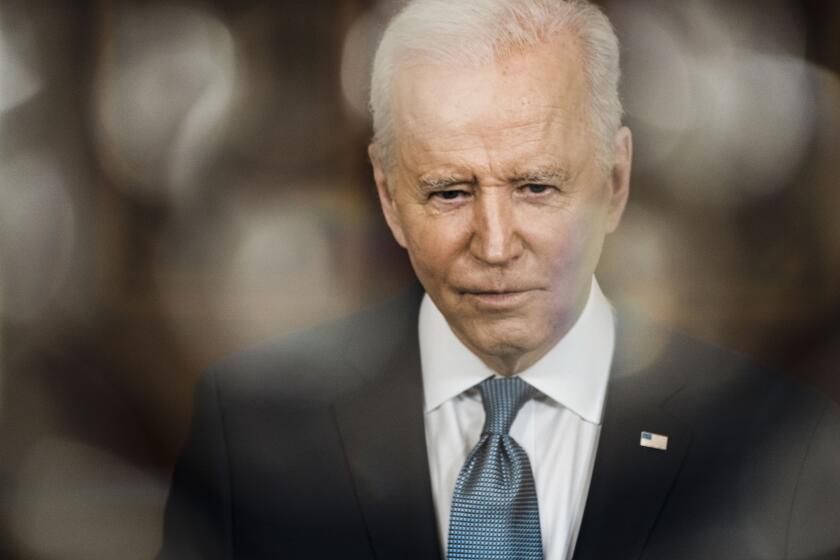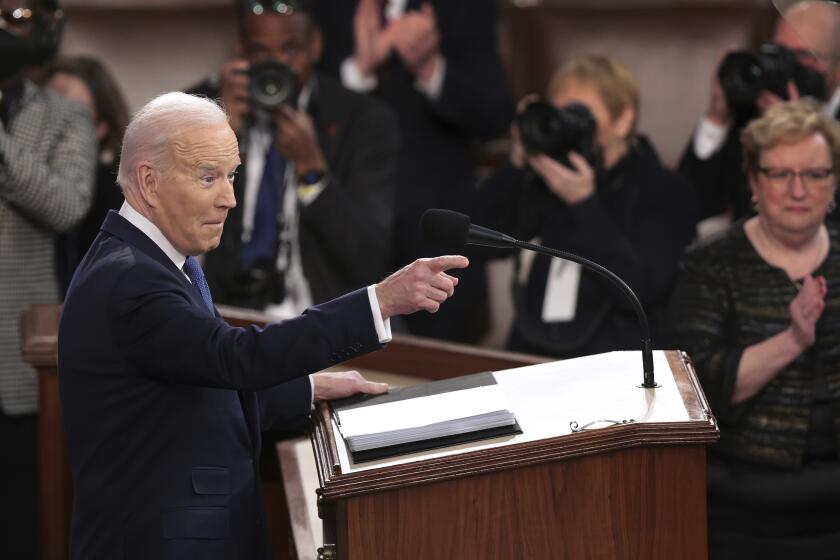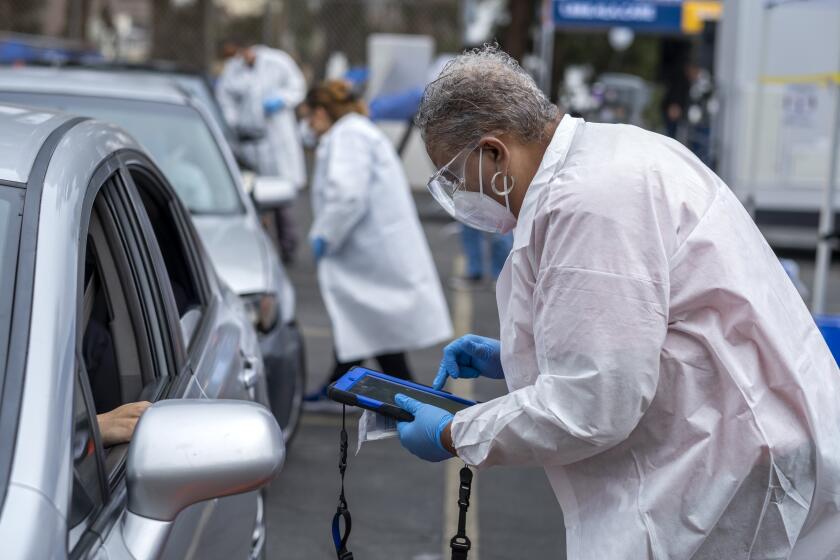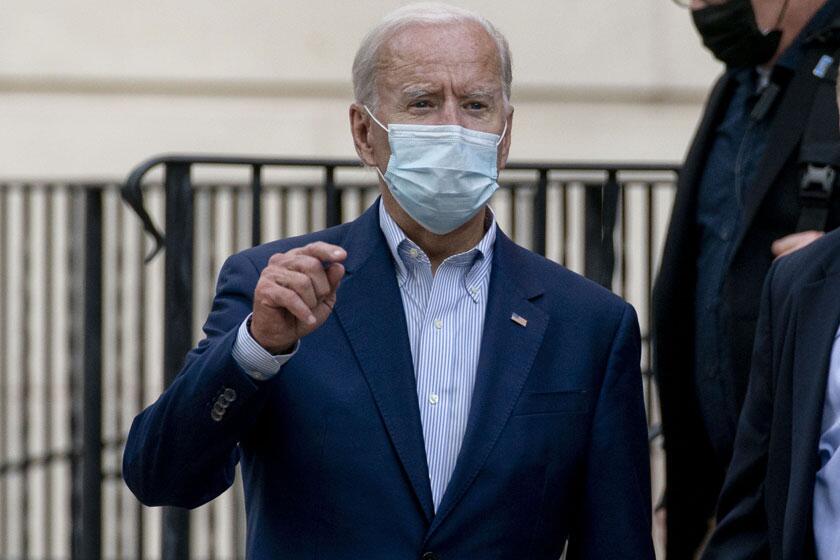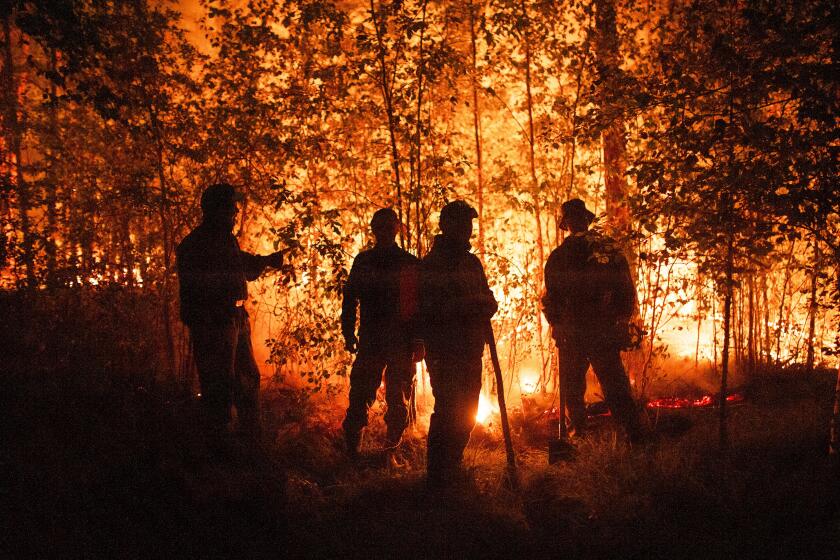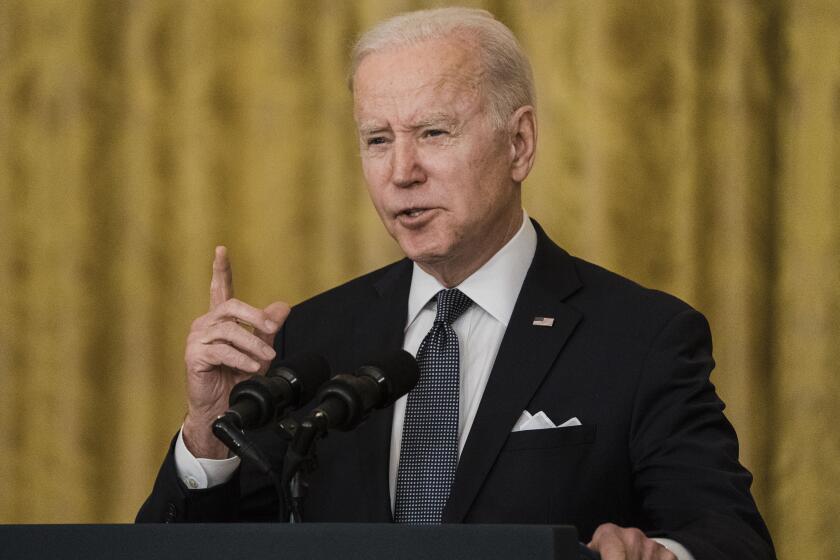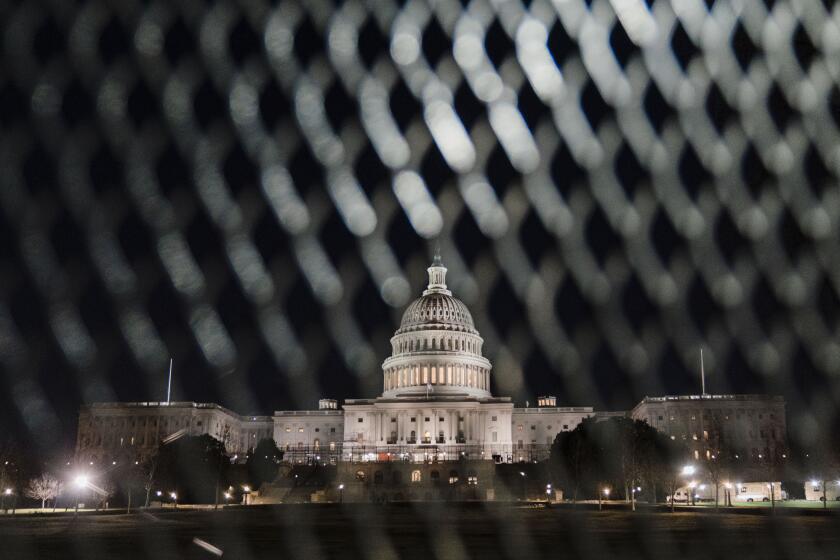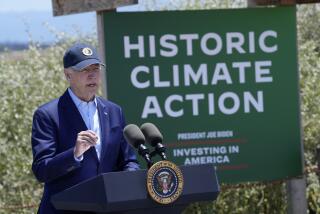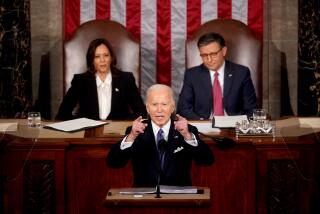- Share via
WASHINGTON — The world is a wild place — we’re enduring a pandemic as we watch war break out in Europe and reel from the effects of record level inflation. Oh, and there’s also a looming climate crisis that threatens to unleash disastrous floods, wildfires and droughts. Amid all the tumult, President Biden is expected to deliver his first State of the Union today, his annual message to Congress in which he lays out the most pressing issues facing the nation, and what he intends to do about them.
Last week, we asked what topics you wanted Biden to cover during his speech (which begins at 6 p.m. Pacific/9 p.m. Eastern). And you answered.
Biden is expected to touch on most of what you asked for. Ahead of his address, here’s a breakdown of what’s happening with the issues that matter most to you.
President Biden delivers his first State of the Union speech amid geopolitical and domestic crises that challenge his presidency.
Inflation
Inflation was the number one issue for those who responded to our callout. In January, consumer prices jumped 7.5% from a year earlier, according to the Labor Department. Supply shortages, vigorous consumer spending and ultra-low interest rates last year didn’t help.
The Federal Reserve signaled that it would raise interest rates in March, after months of downplaying the threat inflation poses to the U.S. economy. The Fed is also looking to tighten the nation’s money supply by shrinking its portfolio of government bonds and securities it purchased to lower long-term interest rates and stimulate economic activity during the early days of the pandemic. Biden is expected to lay out the ways he believes his domestic agenda will help lower costs for American consumers, according to the White House.
The speech comes among a stalled legislative agenda, rising inflation, declining public support and an escalating war in Ukraine
Russia’s invasion of Ukraine
The Ukraine-Russia crisis grasped the world’s attention in a matter of days as Russia initiated an extensive onslaught against its neighbor. While Biden has made clear that U.S. soldiers will not fight in Ukraine, the United States has joined European allies in condemning the assault, levying increasingly stiff sanctions against Russia, including directly against President Vladimir Putin, and providing defensive and humanitarian aid to Ukraine.
As Ukraine’s capital, Kyiv, braces for a full Russian onslaught, an airstrike hits a central square in Kharkiv, the second-largest city.
The days ahead are unpredictable as a round of talks Monday failed to ease Europe’s biggest ground attack in 75 years. Putin aims to decapitate Ukraine’s government and install his own, according to Pentagon assessments. And while Russia’s advance has met strong resistance, its military has pounded the country’s second largest city, Kharkiv, with shelling, and presses on with a 40-mile-long convoy of tanks toward the capital, Kyiv.
Despite the grim global moment, Ukraine may offer Biden an opportunity to garner support and even applause across the aisle in Congress from lawmakers who have rallied behind Ukraine’s fight against Russia. The president will likely emphasize the efforts he’s taken to unify world leaders against Russian aggression and defend Ukraine’s three decades of independence.
The COVID-19 pandemic
The COVID-19 pandemic has dragged into its third year, and with it the many opinions on how to move forward from a virus that has claimed nearly 950,000 lives in the United States.
Just days ahead of the State of the Union, the U.S. Centers for Disease Control and Prevention updated its guidance to relax certain pandemic precautions, following a drop in Omicron cases and the rollout of federal programs to provide free masks and rapid tests. Under the new framework, released Friday, indoor masking is no longer recommended for counties where 72% of Americans live. The White House on Friday emphasized that the country is moving toward a time when the pandemic will no longer disrupt daily life.
It may be optimal for some people 12 and older to space out their first and second shots by eight weeks — especially for males ages 12 to 39 — the federal agency says.
This move further divides a country already split on pandemic response. Some applaud the changes, and are ready to return to some normalcy. Others warn that marginalized communities, including people of color and the immunocompromised, may be severely impacted. Biden will likely seek to strike a unifying balance in his speech, signaling that while there is hope against the pandemic, it’s not time for a victory lap yet either.
Student loans
Since the beginning of the pandemic, millions of Americans have been able to delay student loan payments, thanks to a moratorium put in place under the Trump administration and extended by Biden through May 1. On the campaign trail, Biden vowed to cancel $10,000 of debt per borrower, but that promise remains unfulfilled. Canceling student loan debt is extremely popular among progressives, yet it remains unpopular among moderate and conservative lawmakers. Americans owe around $1.7 trillion in student loan debt, according to the Fed. It’s likely Biden will talk about education but less clear whether he will touch directly on student loan debt.
President Biden has asked the Department of Education to study whether he can unilaterally forgive federally held student loan debt.
Climate change crisis
Biden ran on a campaign promise to tackle climate change and welcome a clean energy revolution. The latest United Nations report on climate change, released Monday, underscored the need for more alternative energy sources, stressing that people’s lives and Earth’s ecosystems are at increasing risk of catastrophe if nations fail to quickly reduce emissions of planet-heating gases.
A warming planet and land-use changes mean more wildfires will scorch large parts of the globe in coming decades, according to a new U.N. report.
But the $555 billion for clean energy and climate investments in the president’s proposed Build Back Better legislation — Biden’s main attempt to combat the climate crisis — remains stuck on Capitol Hill, with more modest, piecemeal initiatives now his best bet. In his State of the Union address, the president is expected to call on Congress to deliver on a legislative agenda for clean energy and climate action that “has overwhelming support from the American people.”
Immigration
Biden promised to modernize the United States’ immigration system, emphasizing the need to make it fair and humane.
Some promises came to fruition: Biden reversed Trump-era policies that restricted people from several Muslim-majority countries and signed an executive order early in his presidency to end family separation practices at the border, creating a task force to reunite those who had been separated from their children.
However, comprehensive immigration reform remains to be seen, and lately, is rarely discussed. The Deferred Action for Childhood Arrivals program is still in legal limbo. The program suspended deportations for thousands of immigrants who arrived in the U.S. as children and are now living in the country without legal permission. The Build Back Better stalemate also means that $100 billion slated for improving the nation’s immigration system is collecting dust. The money would go toward reducing backlogs, expanding legal representation and making the asylum system and border processing more efficient. It’s unclear whether Biden will touch on immigration.
The Biden administration has proposed reversing a rule that denies green cards to applicants who receive certain government benefits.
Voting rights
Democrats have repeatedly failed to bypass the Senate filibuster to get a voting rights bill on Biden’s desk. Senate Republicans have at least three times blocked a simple majority vote on legislation, including ones that would establish election day as a public holiday and create a pathway to challenge new voting laws in court. Democrats contend the legislation is needed to combat Republican efforts at the state level to limit access to the ballot box, while Republicans have said such federal legislation was an attempt to micromanage local elections. Biden did endorse amending Senate rules to pass voting rights legislation, but the change is unlikely as a few key moderate Democrats oppose reform. It’s unclear what Biden will say on voting rights.
Last year, we didn’t get a State of the Union. This year, we are!
More to Read
Get the L.A. Times Politics newsletter
Deeply reported insights into legislation, politics and policy from Sacramento, Washington and beyond. In your inbox twice per week.
You may occasionally receive promotional content from the Los Angeles Times.
